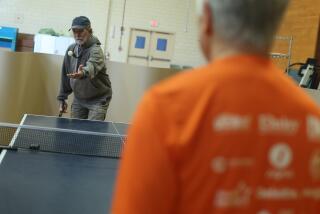Psychological Warfare at Home : Gulf War: Document submitted to Office of Veterans Affairs reports an alarming increase in the divorce rate as well as chemical abuse and anxiety by returning soldiers.
- Share via
The parades are over, the cheering has subsided, the families are reunited, but for many Gulf War veterans the signs of postwar trauma have already surfaced.
Such psychological casualties, which can also envelop entire families, were widely predicted ever since the United States moved closer to open warfare with Iraq last fall.
Although family and military counselors say it’s far too early to pin a statistic on the numbers, the trend even at this stage is disturbing.
“It’s a trickle right now for us--a few Gulf vets are beginning to seek us out, but we’re expecting many more as time passes--it’s inevitable,” said clinical psychologist Ronald Hart, director of the Anaheim-based Vet Center, a federally funded counseling facility serving veterans in Orange County and Long Beach.
Indeed, early concerns that soldiers returning from duty in the Persian Gulf--and their families--would experience significant readjustment disorders have been confirmed, according to a new position paper submitted this week to the Office of Veterans Affairs by a group of psychologists.
Among the problems reported are a disproportionate increase in divorces, growing alcohol and chemical abuse, “relationship disorders” among family members, and individual manifestations of anxiety that range from insomnia to hyper-vigilance.
The document was submitted to the Office of Veterans Affairs secretary Edward Derwinski, as well as to key members of Congress and officials at the Department of Defense. The privately funded paper pulls together the findings of about 20 mental health professionals who treated Persian Gulf personnel and their families.
While carrying no official mandate or imprimatur, the position paper recommends “preventive mental health measures and (seeks to) target areas where early intervention may be necessary.”
The recommendations include federally sponsored studies of veterans and their families “to assess psychosocial and financial needs (associated) with rapid deployment” and to examine “emotional and behavioral reactions of the combat phase of the Gulf crisis.”
Linda Stalvey(, a spokeswoman for the Office of Veterans Affairs in Washington, said “the lessons of Vietnam” had been “very obvious” in her agency’s efforts to deal with possible post-traumatic stress disorder (PTSD) among Persian Gulf veterans and their families.
Stalvey said congressional legislation approved in April will expand veteran centers to handle cases of PTSD among returnees not only from the Persian Gulf, but also from Lebanon, Panama, Grenada and other areas of conflict since the Vietnam War.
“The knowledge bank is there, where it was not 20 years ago,” Stalvey said.
Hart, whose 10-year-old Anaheim center offers employment and marital counseling as well as therapy sessions for stress disorders, said the debriefings held for returning troops, including at the Marine Corps bases at El Toro and Tustin, were the first such mass readjustment programs.
No such programs, which discuss possible social and emotional problems for returnees and their families, were available after the Vietnam and Korean wars, said Hart.
Psychologist Michael Masters, a member of UC Irvine’s family-practice teaching staff and who led a support session in Tustin for El Toro and Tustin base families, put it this way:
“In those earlier wars, these types of counseling programs were still in their infancy. People as a whole didn’t talk openly about such stress disorders or family disruptions,” he said. “What’s great about what’s happening now--such as the vet centers and this new report--is that the concept and need are out in the open.”
“This is essentially groundbreaking stuff,” said Jon Perez, a Los Angeles psychologist who contributed to the paper presented to the Veterans Affairs office. After the Vietnam War, he said, “it never occurred to anyone” to talk to returning soldiers about possible mental problems.
With thousands of Persian Gulf military personnel and their families observed and treated in the last 10 months, “the real significance,” Perez said, “is one, we’ve got problems. And two, instead of letting them fester like we did in Vietnam, let’s do something about it now.”
Another contributor to the report, the University of Cincinnati’s Ellin L. Bloch, an associate professor of clinical family medicine, called the effort an attempt to “employ and go beyond the lessons of Vietnam,” and to build a network among mental health professionals who work with military personnel and their families. “We can’t view the veterans’ needs as separate from the families’ needs,” Bloch said. “The two go hand in hand.”
In short, Bloch said, “these are the kind of psychological traumas that people expected might happen. Now, after 10 months of observation, we can say that these things are happening.”
Bloch and Perez, a specialist in trauma recovery, said there was a surprising degree of unanimity among the psychologists who had worked with veterans and their families.
“We usually work so independently of each other,” Bloch said. “This is the first time that I know of that there has been some attempt to get together a network like this, and to sound an alarm to the government and the VA.”
Bloch said the psychologists--who came together through a series of mutual contacts--hoped to convey the message that “problems like this are no longer a possibility, they are a reality.” They received no government funding, but hope their conclusions will generate federal allocation of funds for further research and treatment.
“We’re concerned with the whole context” of deployment to and return from the war in Persian Gulf, Bloch said. “We’re not just dealing with the phase of re-entry--of ‘welcome home’ and reintegration.”
Bloch said the new document predicts that “for every one individual suffering from unusual stress” after the Middle East conflict, six others will also be affected. But she said the potential “ripple effect” from stresses for Persian Gulf soldiers and their families is so large that “I think we could use a multiple of 10 in this war.”
The report contends that among other problems affecting some returning soldiers and their families, “divorce rates in several areas of the country where military bases are located have quadrupled since military units have redeployed to home stations.”
Perez said the apparent surge in divorces “was not totally unexpected, but it was tragic that it was indeed happening.” He said he had seen data from one military installation--Ft. Hood, near Austin, Tex.--that showed “a 375% rise in filing for divorces over what they consider normal” for the comparable period prior to the war.
Some of the domestic stresses are keyed to the restructuring of the family--the picking up of the pieces--after a parent’s return from war.
“You have a spouse who’s left behind, who had to learn to be on their own and got used to it, and the parent who’s returned and who has to deal with both family role and war traumas at the same time,” Hart said.
“It’s an adjustment process for both parents, the getting back to normalcy,” Irvine-based psychologist Masters said. “It also means dealing with children who have also lived with the prospects of death for one of their parents.”
A lot, Masters added, depends on the family situation before the war. “In some families, there was relief that the parent’s gone. But in others, the experience has strengthened the family and brought them closer together.”
The position paper also states that “emotional and behavioral responses observed among returning veterans include restlessness, increase in substance abuse, withdrawal and social isolation.” Families are also experiencing stresses resulting from financial pressures, from the restructuring of family power and from fears brought on by the threat of chemical or nuclear attack during the war itself.
Hart, the federal Vet Center psychologist in Anaheim, said there are some obvious differences in the Vietnam and Gulf experiences.
“For a large segment of the troops in the Gulf, there was very little actual combat. The war, of course, was relatively brief,” he noted.
But the impacts, no less, could be catastrophic, said Hart, adding: “You had people who were in the mopping-up operations--dealing with body bags with bits of bodies, seeing buddies next to them blown apart. They saw, everyday, the vast and terrible destruction.”
“Everyone is affected in one way or another by such traumatic experiences, even if in varying degrees,” said Hart, whose center handles about 100 cases a week, which includes many Vietnam veterans suffering from delayed-stress disorders.
Hart expects many Gulf returnees will enter a state of psychological denial about war traumas.
“We have (vets) from Vietnam, after 20 years, who are still in denial,” Hart said. “Yet they have gone through much hell since--many jobs, many marriages. But the symptoms are there: the flashbacks, the headaches, the crying in the night, the unrelenting anger.”
“We expect this, too, is happening to many Gulf veterans,” he added.
Hart has praise for the numerous celebrations of the Gulf troops’ return--in contrast, he said, to the deafening silence and “aura of shame” that greeted most Vietnam veterans in the ‘60s and ‘70s.
“The parades do serve a worthwhile purpose. They do give a huge emotional boost to our returning men and women,” Hart said.
But, he added, “when the applause has stopped, when the welcomes have run their course, these people still have to deal with certain deeply embedded realities. The question, then, is whether they deal with it now--or later.”
More to Read
Sign up for Essential California
The most important California stories and recommendations in your inbox every morning.
You may occasionally receive promotional content from the Los Angeles Times.













